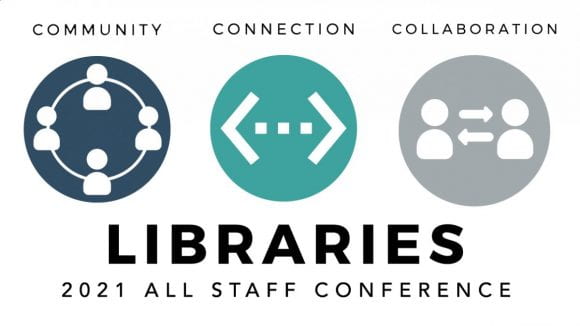By: Gale Biddle
Sue McElvenney is a part-time staff member at the Robert E. Eiche Library at Penn State Altoona, and quite possibly, one of the nicest people you will ever meet. She began working at the Library as a work-study student in the Fall of 2016. With her hard work and dedication, she earned a position as a part-time evening/weekend supervisor, which she has been doing ever since.
Sue was born and raised in Philadelphia, Pennsylvania, with her two younger sisters, Kathy and Terry. One of her first jobs there was as a substitute “lunch mom” where she was paid $5 a day to watch over the first graders at lunch. Philadelphia is also where she learned to make a proper cheesesteak (it should be noted that lettuce, tomato, and mayo are absolutely forbidden on them). And although you would never suspect it if you met her, Philadelphia is also where she performed as a fire-breather! She moved to Altoona, Pennsylvania in 2012 after her boyfriend, Anthony, returned there to take care of family. She spent several years waitressing but when two of the restaurants she worked at went out of business, she realized she needed some job security. At that point, she decided to come to Penn State.
Though a non-traditional student, Sue found that Penn State made it very comfortable for adult students. She says that “the teachers were wonderful,” and the experience of having a wide range of ages in class (from first-year students to people in the Go-60 program) gave the classroom discussions a broader perspective. She majored in Psychology, and it was at a
Psychology Club meeting where she learned about a master’s program in Social Work. It sounded like something she truly wanted to do, so she applied and was accepted to Temple’s
online program. She will be part of just the second class to complete the online program. Now, with her master’s degree in Social Work soon to be conferred, she plans on becoming a clinical social worker. She is currently interning at an alcohol rehabilitation facility, where she finds fulfillment in building a rapport with the clients and in the process of active listening. She says her classes have meshed perfectly with her field work.

Sancho Squirrel
In the rare bit of spare time where she is not working at the library, working at her internship, or studying for her classes, Sue enjoys spending time with her boyfriend and their four cats: Pete, Peaches, Tioga, and Murray. In addition, Sue says, “I also take joy in good food and good books. I like to cook and write almost as much as I like to read and eat.” She enjoys a nice kayaking trip, too. She also has three nephews: Nick, Michael, and Alexander.
Unfortunately for us here at the Library, Sue will eventually move on to her new career. And though we will miss her, I am certain that she will go on to change people’s lives. As you may know, Philadelphia’s nickname is “The City of Brotherly Love.” If anyone exemplifies that, it is Sue. To dedicate her career to helping those who are struggling and in need of help-that is the true definition of brotherly love, something the world could always use more of.
Ten Random Questions with Sue:
1. Three most influential people in your life? High school English teacher Sister Ave, choir teacher Eddie Walker, and high school mentor Marguerite Simmons
2. Favorite food? Sushi
3. If you had $100 to spend and all your friends were busy, how would you spend it? Go to the bookstore and then to a nice placefor lunch, preferably with outdoor seating.
4. Would you rather visit the future or the past? Future
5. Favorite season? Summer
6. Last show you binge-watched? Awkwafina is Nora from Queens
7. If you could have dinner with any three people, who would it be? Paul Tremblay, Boots Riley, and Neil Gaiman
8. Pet peeve? People who say “You’re welcome” or “Thank you” in a sarcastic way
9. Favorite book? Survivor Song
10. If you had to listen to only one song forever, what would it be? “Uptown Funk” by Mark Ronson and Bruno Mars










